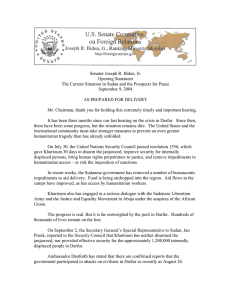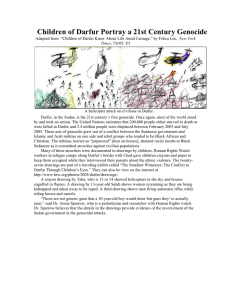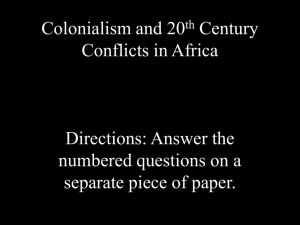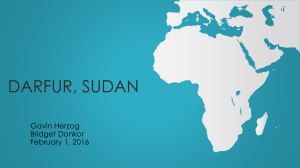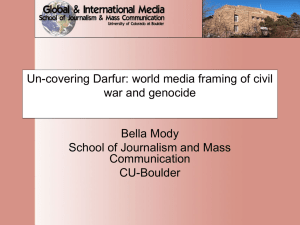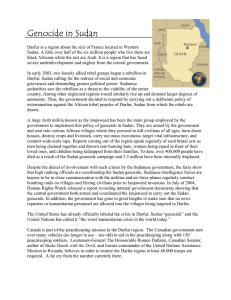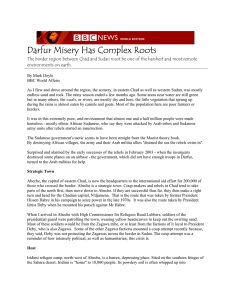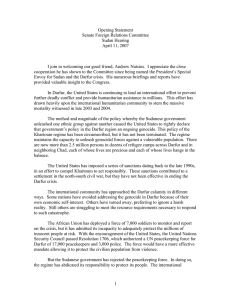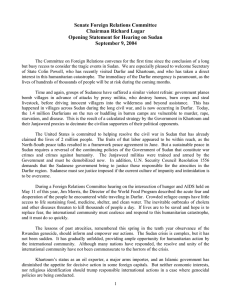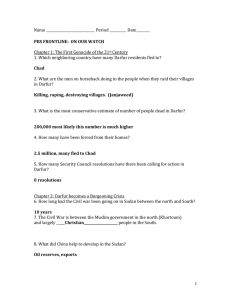Covering Darfur: The Guardian vs. Le Monde 1
advertisement
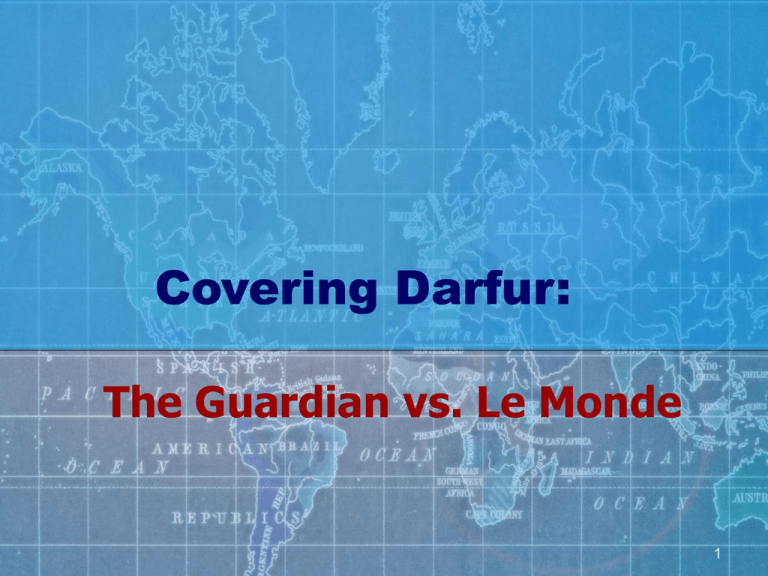
Covering Darfur: The Guardian vs. Le Monde 1 Background • Historical and economic resonance • Britain’s colonial ties with Sudan -From colonial master to US ally • British interest in Sudanese oil industry -BP & others invested in oil industry • France’s colonial history in North Africa -Viewed African nations as partners • French interest in Sudanese oil -TOTAL holds the largest oil concessions 2 Analysis • Guardian (83 stories) • • • • Elite British newspaper since 1821 Comprehensive international news coverage Liberal or left-of-center stance Critical of wars in Afghanistan and Iraq • Le Monde (92 stories) • • • • French newspaper of record since 1944 Analysis and commentary Moderate or left-leaning Criticized for supporting French government policies 3 The Guardian • Major actors • Sudanese government: Unlawful & brutal regime • Janjaweed: Criminals backed by Sudanese gov’t • Rebels: Victims of atrocities committed by Sudan gov’t & Janjaweed • UN: Active but ineffectual • UK government: Active mediator • US: Aggressive power w/ threats of sanctions & military intervention • AU: Most appropriate mediator 4 The Guardian • Use of Contested Words • Genocide, ethnic cleansing, humanitarian crisis, militia puppet-master • Causes of Crisis • Unequal access to natural resources • Ethnic tension btw. Arab elites & black Africans 5 The Guardian • Framing • Blaming Sudanese gov’t & Janjaweed • Description of atrocities: scorched-earth campaign, murder, torture, rape, etc. • Inclusion of voices from displaced victims, rebel soldiers, foreign aid workers • Ending the conflict: • Providing logistical support for African Union • Indictment to international criminal court 6 Le Monde • Major actors • Sudanese gov’t: Villain & perpetrator of atrocities • Janjaweed: Allies of Sudanese gov’t, initiated a reign of terror with murder, rape, etc. • Rebels: Victims & perpetrators of atrocities • UN: Incompetent • French gov’t: No active role, focus on humanitarian assistance through EU • US gov’t: Protector of the Darfurians, inactive in spite of “genocide” claim, semantics game, delayed reaction to Darfur crisis • AU: An African solution to an African problem 7 Le Monde • Use of Contested Words • • • • Restoring peace in Darfur Humanitarian crisis, crimes against humanity Sudan exploits and arms Arab tribes, reign of terror Extermination campaign, politics of burning the ground • Causes of Crisis • Armed insurrection against Sudan gov’t & gov’t response of arming militant Arabs • Janjaweed in search of profits in Darfur 8 Le Monde • Framing • Labels Darfur crisis as civil war: Janjaweed vs. Darfuris / Arabs vs. Africans • Blames Sudan gov’t, Janjaweed & rebels for atrocities • Describes atrocities: Burning the ground, Janjaweed as villains alleged for murder, rape & destruction • Avoids labeling the crisis “genocide” or “ethnic cleansing” • Depends heavily on news agencies (55%): Lack of voice from displaced victims & rebel soldiers • Uses analysis vs. giving the facts: Focuses more on diplomacy rather than what is happening in Darfur 9 Comparison The Guardian •Initially, resonates with US view of ethnic cleansing & calls for UK intervention •Later, supports nonmilitary option & presents AU involvement as solution •Describes US/UK as unwilling to intervene while UN is inefficient •Provides historical references •Treats rebels as victims Le Monde •Challenges US view of ethnic cleansing & genocide •Frames Darfur crisis as civil war/ethnic strife, thus presents AU involvement as a solution •Describes UN positively •Omits voices of rebels, Darfurians •Relies heavily on wire services 10 Making Sense of the Findings • European coverage of African conflict • Both dailies focus on Darfur as humanitarian crisis • The Guardian is more active in covering what is happening on the ground than Le Monde • Solution to Darfur crisis? • Both dailies converge in supporting peaceful solution by presenting AU as the best mediator instead of UN sanctions/intervention 11
